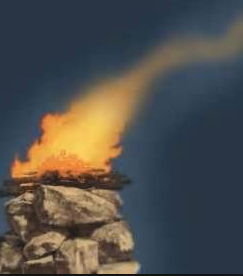Was Jesus’ death on the cross a sacrifice?
22-04-2016 - Posted by Andre Piet Recently someone responded to a bible study he had listened to, in which I had said that the sacrifice of Jesus Christ refers to his resurrection. He wrote to me:
Recently someone responded to a bible study he had listened to, in which I had said that the sacrifice of Jesus Christ refers to his resurrection. He wrote to me:
Don’t 99% of the believers think that the sacrifice of the Son was his death on the cross? Maybe I’m unable to see clearly or I’m thinking too much traditionally. But I cannot see so well that for Him his resurrection was the sacrifice. Can you make it more clearly for me?
A good question! Indeed, by far the majority of the believers think that the sacrifices of the Old Testament are a picture of Jesus’ death on the cross. And there is an undeniable element of truth. An unblemished male goat or a bull came in hands of the priest to be slaughtered. And that is what happened to Jesus. He came into the hands of the priests, who gave him to crucify.
Slaughter is not a sacrifice
But… when an animal was slaughtered, it was not offered yet. The slaughter preceded the sacrifice. The real sacrifice took place after an animal was slaughtered and laid down on the altar ( a platform) to go up in smoke “for a fragrant odor”. That is the real sacrifice. An animal only slaughtered is not yet sacrificed. The slaughter was necessary to become a sacrifice. As simple and obvious as the link between the slaughtering of an animal and Jesus’ death on the cross, as logical is the connection between the real sacrifice and Jesus’ resurrection and ascension. Because first the slaughter takes place and afterwards the sacrifice. … “The blood of His cross” was not the end (Colossians 1: 20). Because “the Lambkin as though slain” rose from the dead (Revelation 5: 6)! He was raised and ascended to be a fragrant odor for God. That speaks of Him who, after He died, was raised by God and ascended into heaven. Precisely that sequence of slaughter and sacrifice provides a complete picture of “the sufferings pertaining to Christ and the glories after these” (1 Peter 1: 11). Without slaughter no sacrifice. But only slaughter is not a sacrifice.
Emphasis on the resurrection
It is very important to understand this emphasis on the resurrection. For the purpose of slaughter is the sacrifice that follows. Why was it necessary that Jesus died? To be able to raise up from the dead. That’s the fragrant odor. Not Jesus’ death in itself was lovely for God. On the contrary. Such as the killing of an unblemished animal is a sin in itself, it is said of Golgotha:
The One not knowing sin, He (= God) makes to be a sin-offering for our sakes… – 2 Corinthians 5: 21 –
God gave his Son to bear the sins, that is he bore the injustice that was done to Him. A hostile world crucified and killed Him. But precisely in this way God creates peace and reveals Life. Thus Jesus died not only because of our sins, but above all “for our sins” (1 Corinthians 15:3). Christ, being roused from among the dead, is no longer dying. Death is lording it over Him no longer. (Romans 6: 9-10) If Christ had not been roused, we would still be in our sins! (1 Corinthians 15: 17)
The Hebrew letter
That the slaughter and sacrifice of Christ do not only refer to the cross, is also reflected in the explanation of the writer of the Hebrew letter. He explains why the high priest sacrifices with the blood of a male goat in the sanctuary. It speaks of the shed blood of Christ and of Him who, then as the living High Priest (7: 16) entered into the heavenly sanctuary (9: 12, 24: 27). That was the place of the sacrifice. In Hebrews 10: 19 and 20 we read that in “the blood of Jesus” a “new and living way” was consecrated into the heavenly sanctuary. But literally in Greek is not written “new” but “recently slain and living way”. Here again, the same idea. “The blood of Jesus” refers to a previous slaughter. The living way into the sanctuary on the other hand speaks of Him who was resurrected and ascended to God.
Is the cross a satisfaction to God?
It’s not the idea that on Golgotha God punished His Son for the sins of the people, or that Jesus on the cross bore the anger of God as a satisfaction. That is a theological idea; it was already said long ago, but it’s not findable in the Scripture. People killed the Son of God. That was the ultimate sin. But God turned this slaughter into a sacrifice by raising his Son. And in that way He realized Life and conciliation for a dying and hostile world. That is the fragrant odor that ascended when the Son left the tomb definitively. ![]() MH
MH

 English Blog
English Blog